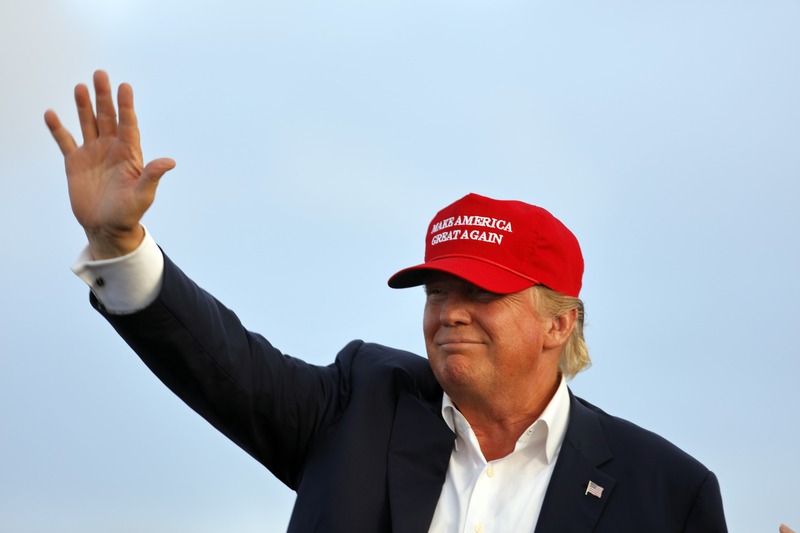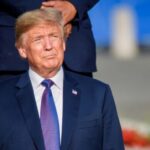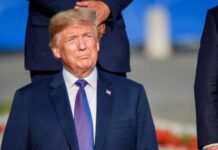President Donald Trump lashed out at reporters during a tarmac exchange at Palm Beach International Airport on Sunday, November 16, calling one journalist “terrible” and dismissing their questions as attempts to deflect from what he described as his administration’s successes. The 79-year-old president’s outburst came as he spoke at the airport, fielding questions about the ongoing controversy surrounding Jeffrey Epstein files and criticisms from within his own party.
The confrontation began when a reporter asked Trump about comments made earlier Sunday by Representative Thomas Massie, a Kentucky Republican who suggested that a Justice Department probe into Epstein documents could be a “smokescreen” to prevent their full release. Trump’s response was immediate and hostile.
“Well, I don’t want to talk about it because fake news like you, you’re a terrible reporter, and fake news like you they just keep bringing that up to deflect from the tremendous success of the Trump administration,” Trump said. He then pivoted to attacking the 54-year-old congressman.
Massie’s concerns stem from Trump’s Friday directive to Attorney General Pam Bondi to investigate Epstein’s relationships with prominent Democrats, including former President Bill Clinton. Speaking on ABC’s “This Week” with Jonathan Karl earlier on Sunday, Massie warned that ongoing investigations could legally block document releases, suggesting the Justice Department’s actions might be designed to prevent transparency rather than promote it.
The controversy has created unusual tension within Republican ranks, particularly after Trump posted on Truth Social on Sunday urging House Republicans to vote for releasing the Epstein files. He stated that the Justice Department was examining various Democratic operatives and their relationships to Jeffrey Epstein, adding that the House Oversight Committee could have whatever materials they were legally entitled to access. A House vote on the Epstein files is reportedly scheduled for Tuesday.
Trump’s combative mood extended beyond the Epstein questions. A second reporter interrupted the president while he was answering a question about former Fox News personality Tucker Carlson’s recent controversial interview with far-right podcaster Nick Fuentes. Trump immediately cut off the journalist with a sharp rebuke.
“Will you let me finish my statement? You are the worst,” Trump said. “You’re with Bloomberg, right? You are the worst. I don’t even know why they have you.” The president’s reference to Bloomberg suggests the reporter may have been affiliated with that news organization, though the specific identity remains unclear from available reports.
The Tucker Carlson question touched on another sensitive subject for the administration. The former cable news host has faced criticism from conservative circles for his friendly interview with Fuentes, a white nationalist figure. Trump defended Carlson’s editorial choices, praising him for saying “good things” about the president over the years and arguing that journalists should be free to interview whomever they choose.
Trump’s connection to Fuentes has its own complicated history. The president dined with both Fuentes and rapper Kanye West at Mar-a-Lago in 2022, an incident that generated significant controversy at the time. Trump later claimed he did not know who Fuentes was when West brought him as a guest to the private club.
Sunday’s hostile exchanges with reporters represent part of a broader pattern of contentious media relations that have characterized Trump’s political career. Presidential interactions with the press serve an important democratic function, allowing journalists to question leaders and hold them accountable to the public. When these exchanges become confrontational, they raise questions about transparency and access to information.
The timing of Trump’s outbursts is particularly notable given the mounting pressure surrounding the Epstein files. The convicted sex offender’s connections to various political and business figures have remained a subject of intense public interest, with many Americans calling for full transparency regarding any documents that might shed light on those relationships. The House vote reportedly scheduled for Tuesday will test whether Republicans follow through on releasing materials that could contain politically sensitive information.
Massie’s willingness to publicly question the administration’s approach demonstrates that not all Republicans are willing to accept the president’s framing of the Epstein controversy. As a frequent dissenter within the GOP-led House, Massie has established a reputation for independence that sometimes puts him at odds with party leadership.
The president’s accusation that reporters are using the Epstein story to deflect from his administration’s accomplishments reveals his preferred narrative: that media coverage of the controversy is politically motivated rather than a legitimate news story. This framing allows Trump to position himself as a victim of biased coverage while avoiding substantive engagement with questions about the documents and their potential release.
As the Tuesday House vote approaches, the tension between Trump’s public call for releasing the files and concerns about Justice Department investigations creating legal barriers to transparency remains unresolved. The outcome will indicate whether the administration’s stated support for disclosure translates into actual transparency or whether procedural obstacles will ultimately prevent the public from accessing potentially significant information about Epstein’s connections to powerful figures across the political spectrum.











